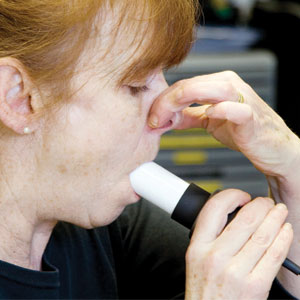In less than four months’ time the protective doors on general practice will be blown off. Some practices could lose as much as 10-15% of their funding at a stroke, as local enhanced services are for the first time put out to competition.
A Pulse investigation reveals that CCGs and local authorities are planning to put local enhanced service funding worth millions of pounds out to Any Qualified Provider (AQP) or full competitive tender from 1 April.
GP services such as anticoagulation clinics, spirometry and minor surgery will be thrown open to the vagaries of the NHS market, in what could represent a feeding frenzy for private companies.
With just months to go, more than half of CCGs have yet to decide whether they will put their LESs out to tender, prompting the GPC to warn that GPs will have very little time to prepare any bids.
Under NHS England procurement rules, CCGs have to put all their LESs out to tender or procure them under AQP unless they can prove the service can only be offered by a single provider. Recommissioned LESs will be rebranded as ‘community service contracts’ (CSCs).
Pulse approached every CCG in England, asking them how they planned to recommission their LESs, and also approached dozens of local authorities to ask what they planned to do with their public-health LESs. Some 48 CCGs replied, with 23 having made a decision so far. Of these, nine plan to put some or all of their LESs out to tender (see map). The services put out to tender in those nine areas are collectively worth an estimated £2.025m. Extrapolated across England, these figures suggest around £18.6m worth of services could be opened up to the market. And this could be just the beginning.
In addition, two local authorities confirmed they will be putting enhanced services out to tender, out of 12 who confirmed to Pulse they had made a decision.
Meanwhile, Pulse can reveal private providers are keeping a watchful eye on the potential to pounce on the contracts on offer, with Alliance Boots, BUPA and Celesio UK – which owns the Lloydspharmacy brand – among those to express interest.
Enhanced services are a vital source of income for practices. As GPC deputy chair Dr Richard Vautrey says, the current LESs ‘are worth around 10-15% of the average practice’s income – and this is a time when GPs have to make every penny count’.
So what can GPs expect come April with their first direct dealings with the new competition regulations?
Pulse’s investigation reveals CCGs are interpreting the competition regulations in varying ways.
In Essex, three CCGs – Basildon & Brentwood, Castlepoint & Rochford and Thurrock – are putting all their current LESs, worth a total of £753,000, out to tender via the AQP route.
They claim they are doing this to avoid ‘potential conflicts of interest’, saying: ‘It was considered that the AQP process was a fair and transparent way of commissioning these services long term.’
NHS West Leicestershire CCG, meanwhile, is putting 10% of its LESs out to AQP, although it is unable to say what this will be worth. Neighbouring NHS East Leicestershire & Rutland CCG is putting 12% of services out to AQP.
Meanwhile, NHS Stockport CCG could put 40% of its LESs out to full tender (see case study, right). Local GPs’ bottom line could be hit to the tune of £383,200.
At the other end of the scale, 14 CCGs have already decided to extend existing GP-held contracts. NHS Rotherham CCG will be publishing a voluntary transparency notice on the Supply2Health procurement portal to allow potential competitors to come forward for future consideration. For now, its LESs – worth £616,000 in total, including an anticoagulation service, an aural care service, a blood monitoring service and a scheme for secondary care services provided in primary care – will continue to be provided by local GPs without the need for a competitive process.
NHS Isle of Wight CCG is another that plans to keep services with GPs.
It said of the decision: ‘The majority of our services are small but vital. All GP practices are providing them, there are high levels of patient satisfaction, and we can demonstrate clear cost-effectiveness.’
The CCG took advice from procurement experts and it feels ‘the costs of tendering would outstrip any benefits our patients would have gained and in all likelihood would have cost us more’.
Public health LESs
Local authorities took control of the £2.7bn NHS public health budget from April and are also going through the process of deciding whether to recommission public health LESs from GPs or go down the tendering route.
Department of Health guidance earlier this year told councils that GPs should not be given ‘preferred provider status’ for public health LESs and instructed councils to use ‘appropriate procurement approaches’.
Derby City Council told Pulse it is putting all of its LESs worth £501,000 out to tender, including £75,000 worth of contracts currently commissioned by NHS South Derbyshire CCG that will pass to the local authority in April. Neighbouring Nottinghamshire County Council is putting two of its six LESs out to AQP.
Running out of time
In those areas that have yet to decide how they will recommission their LES contracts, GPs are running out of time to put together bids.
This could cause real problems as the April deadline approaches; the experience of practices who have gone through the tendering process is that they quickly become entangled in complex red tape.
Pulse has obtained a copy of a document produced by Lancashire Commissioning Support Unit, which requires GPs and other potential providers to fill in what is known as ‘initial contract information’, covering safeguarding policy, serious untoward incidents and insurance documentation, if they want to continue to provide LESs.
GPs in Lancashire also have to fill out ‘organisation crime profile’ forms, which focus on violent incidents at the practice, bribery and fraud.
Dr Peter Higgins, chief executive of Lancashire LMC, told Pulse this created ‘duplication’, with practices needing to provide the same information they give to regulators.
And if the experience of those that have applied for public health LESs from particularly keen local authorities is anything to go by, practices could be deluged by even more paperwork.
GPs in London expressed concern that local authorities were giving GPs ‘300-page’ tender documents to bid for public health work, such as cardiovascular screening, sexual health services and smoking cessation services.
‘The longer CCGs leave these decisions, the greater the uncertainty for practices’ Dr Richard Vautrey
GPC deputy chair Dr Richard Vautrey says: ‘The longer CCGs leave these decisions, the greater the uncertainty for practices and the less opportunity GPs will have to plan for what happens if they want to maintain their services beyond April. Three months is a short time for them to jump through the various hoops that will be required.’
Private sector poised
Meanwhile, private providers, who already have the infrastructure to tender for contracts, are keeping a close eye on the situation.
Andrew Willetts, public sector and healthcare services director at Celesio UK, which owns the Lloydspharmacy brand, told Pulse the changes to enhanced services ‘give Celesio UK a unique opportunity to innovate and develop solutions for the NHS which not only enhance care for patients, but also provide efficient and cost-effective alternatives’.
Celesio’s rival, Alliance Boots, says it will review the tendering process ‘on a case-by-case basis’ to see if there is ‘anything close to our core offering of medicines optimisation services, screening and monitoring for patients with long-term conditions and public health services where commissioned by CCGs such as flu immunisation’.
A BUPA spokesperson says it is ‘increasingly looking to work with the public sector in areas where we have expertise, such as out-of-hospital care and chronic disease management’, while Virgin Care says it will consider bidding ‘only if we believe we can genuinely improve the care currently on offer’. However, it clarified that LESs are not its ‘main focus currently’.
Dr Vautrey says GPs are comparatively ill-equipped to deal with the bureaucracy of the bidding process. He adds: ‘GPs are well-placed to bid against private providers, but in general are not used to doing so. Practices will be up against organisations who are experts at producing the necessary documentation and so may have an advantage, at least initially.’

‘It is potentially money
lost to general
practice’- Dr David Gilbert, chair
of Stockport LMC
Read his story here
Will it be worth it?
Dr Nigel Watson, chair of the GPC’s commissioning subcommittee and chief executive of Wessex LMCs, has identified another potentially major impact of the imposition of competition on general practice.
He claims that while practices may instinctively want to retain provision of services they have historically provided, the economics will require careful consideration: ‘Many LES contracts are for quite small amounts of money, relatively speaking, and practices might find that it’s not worth their while as the tendering process can be quite time-consuming and costly.
’And that may mean they have a decision to make about whether they need to federate in order to make it worthwhile bidding. We’re already seeing the beginnings of that and I think some practices will take it a stage further and form their own provider organisations.’
A GP commissioner’s guide to tender applications

1 Focus on the priorities for your area
Do your plans meet the proposals of the commissioners, whether CCG, public health or NHS England? If not, change them. Acknowledge the plans in your paperwork.
2 Ensure your proposals are competitive
For tenders especially, make sure your plans are robust and clinically focused. While it is important to keep to the strengths of general practice, you need to be professional enough to compete.
3 Work with local practices
Talk to other practices locally and work together where possible. Safety and sustainability are vital and practices can often work together to improve skill mix and cost-effectiveness.
4 Integration is key
Commissioners and patients want care pathways to be seamless so integration of services is important. Look for gaps and talk to other providers at different stages of the pathway.
5 Involve patients
Make sure you consult your patients. Plans with a significant amount of patient involvement are usually obvious and welcomed.
Dr Steve Kell is co-chair of the NHS Clinical Commissioners leadership group and chair of NHS Bassetlaw CCG
Pulse October survey
Take our July 2025 survey to potentially win £1.000 worth of tokens












